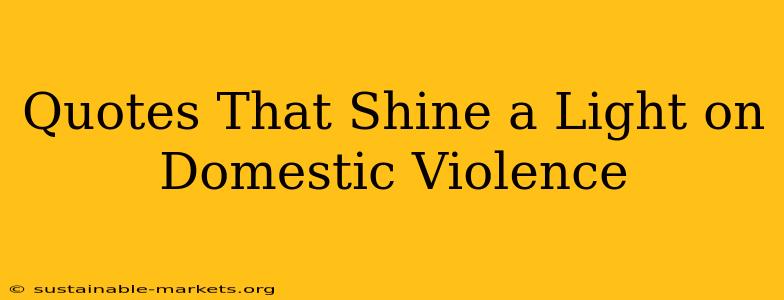Domestic violence, a pervasive issue shrouded in secrecy and shame, leaves countless individuals trapped in cycles of abuse. Understanding its complexities requires empathy, knowledge, and a willingness to confront the harsh realities. While statistics paint a grim picture, the lived experiences of survivors often resonate most powerfully through their words. This article explores poignant quotes that shed light on the insidious nature of domestic violence, its impact on victims, and the path toward healing and empowerment. We'll also delve into frequently asked questions surrounding this critical issue.
What are the signs of domestic violence?
Recognizing the signs of domestic violence is crucial, not only for those experiencing it but also for those who want to help. Domestic violence isn't always physical; it encompasses a range of abusive behaviors. These can include physical assault (hitting, slapping, pushing), emotional abuse (constant criticism, humiliation, threats), verbal abuse (insults, yelling, name-calling), economic abuse (controlling finances, preventing work), and sexual abuse (forced sexual acts, unwanted touching). The subtle and insidious nature of abuse often makes it difficult to identify, as abusers often manipulate and isolate their victims.
How can I help someone I suspect is experiencing domestic violence?
Supporting a victim of domestic violence requires sensitivity and understanding. The most important thing is to listen without judgment, validate their experience, and let them know they are not alone. Encourage them to seek help, but avoid pressuring them. Offer practical support, such as helping them find resources, accompanying them to appointments, or providing a safe place to stay if necessary. Remember, it's their journey, and you are there to support them, not to solve their problems for them. Never force the issue or try to confront the abuser directly, as this could escalate the situation and put the victim at greater risk.
What are the long-term effects of domestic violence?
The consequences of domestic violence extend far beyond physical injuries. Survivors often experience long-term physical, emotional, and psychological trauma. Physical effects can include chronic pain, sleep disturbances, and various health problems. Emotionally, victims may struggle with anxiety, depression, low self-esteem, PTSD, and difficulty forming healthy relationships. The psychological impact can be profound, leading to feelings of isolation, fear, and powerlessness. These effects can persist for years and impact every aspect of a survivor's life, highlighting the need for comprehensive support and therapeutic interventions.
Is domestic violence only physical abuse?
No, domestic violence encompasses a wide spectrum of abusive behaviors, far exceeding physical assault. Emotional, verbal, economic, and sexual abuse are all forms of domestic violence and can be just as damaging, if not more so, than physical abuse. These forms of abuse often erode the victim's self-esteem, sense of identity, and ability to make independent decisions. They can be incredibly insidious and difficult to recognize, as they often manifest as subtle manipulations and controlling behaviors.
How can I protect myself from domestic violence?
While prevention is always preferable to intervention, recognizing early warning signs and establishing healthy boundaries are crucial in protecting yourself from domestic violence. These include paying attention to controlling behavior, jealousy, possessiveness, and threats. Seek professional help early on to address such behaviors. Building a strong support system of trusted friends and family members can also offer protection and emotional support. Remember that you deserve to feel safe and respected in all relationships.
Powerful Quotes Illuminating Domestic Violence
Here are some quotes that encapsulate the struggles and resilience of survivors:
- "The most common way people give up their power is by thinking they don't have any." - Alice Walker. This highlights the insidious control exerted by abusers.
- "The opposite of love isn't hate, it's indifference." - Elie Wiesel. This emphasizes the emotional neglect and isolation experienced by many victims.
- "Violence is the last refuge of the incompetent." - Isaac Asimov. This offers a perspective on the abuser's inability to resolve conflict peacefully.
- "The greatest weapon against stress is our ability to choose one thought over another." - William James. This speaks to the importance of reclaiming agency and breaking free from negative thought patterns.
These quotes, while not directly about domestic violence, touch upon themes of power, control, and emotional resilience—all deeply relevant to the experience of survivors. They serve as reminders of the importance of recognizing the signs of abuse, seeking help, and building pathways to healing and empowerment. Further research into the specific experiences and quotes of survivors will provide a richer understanding of this critical issue.

